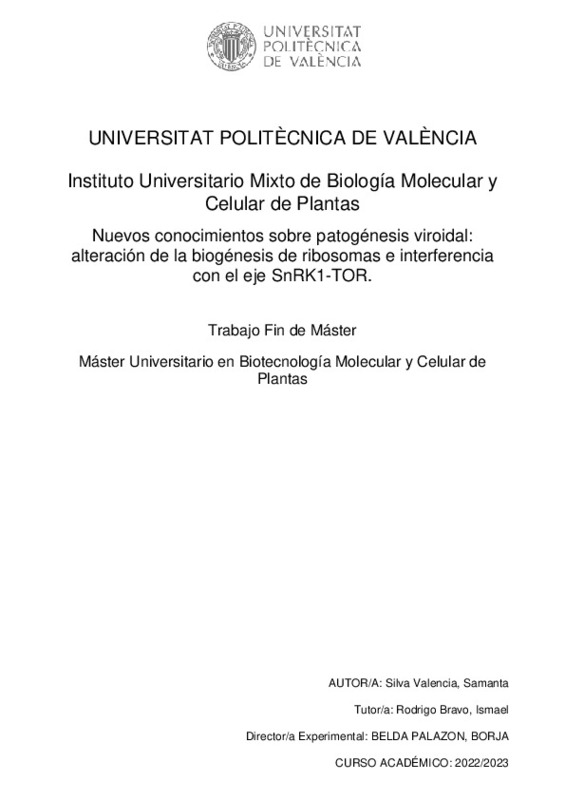JavaScript is disabled for your browser. Some features of this site may not work without it.
Buscar en RiuNet
Listar
Mi cuenta
Estadísticas
Ayuda RiuNet
Admin. UPV
Nuevos conocimientos sobre patogénesis viroidal: alteración de la biogénesis de ribosomas e interferencia con el eje SnRK1-TOR.
Mostrar el registro sencillo del ítem
Ficheros en el ítem
| dc.contributor.advisor | Rodrigo Bravo, Ismael
|
es_ES |
| dc.contributor.advisor | Belda Palazón, Borja
|
es_ES |
| dc.contributor.author | Silva Valencia, Samanta Gissela
|
es_ES |
| dc.date.accessioned | 2023-02-13T09:25:53Z | |
| dc.date.available | 2023-02-13T09:25:53Z | |
| dc.date.created | 2023-01-27 | |
| dc.date.issued | 2023-02-13 | es_ES |
| dc.identifier.uri | http://hdl.handle.net/10251/191791 | |
| dc.description.abstract | [ES] Los viroides son pequeños patógenos vegetales con capacidad autorreplicativa, constituidos por una cadena de RNA monocatenaria circular con una elevada estructura secundaria. Los viroides no tienen capacidad codificante; sin embargo, pueden infectar y causar enfermedades graves en plantas susceptibles. Los estudios de patogénesis viroidal se han centrado principalmente en la capacidad de estos patógenos de inducir silenciamiento génico, pero la relación precisa entre estos u otros procesos todavía por descubrir y la sintomatología viroidal sigue siendo desconocida. Recientemente, en nuestro laboratorio hemos observado que las infecciones viroidales causan estrés ribosomal en plantas de tomate al interferir en el procesamiento de los pre-RNA ribosómicos (pre-rRNA) alterando, por tanto, la fisiología y el metabolismo de la planta. En este sentido, numerosos estudios implican a las kinasas de actividad antagónica TOR (Target of Rapamycin) y SnRK1 (Sucrose non-fermenting-Related protein Kinase 1), que son reguladores maestros del metabolismo celular, en procesos de patogénesis vegetal como infecciones virales y bacterianas. En este Trabajo de Final de Máster se pretende profundizar en el papel del estrés ribosomal causado por la patogénesis viroidal, a través del estudio de posibles alteraciones en el complejo U3 snoRNP (U3 small nucleolar ribonucleoprotein), que es necesario para el procesamiento de los pre-rRNA. De la misma forma, se propone investigar nuevos mecanismos moleculares implicados en la patogénesis viroidal, a través del estudio de la interacción del viroide del tubérculo fusiforme de la patata (PSTVd) con las rutas de señalización reguladas por las kinasas TOR y SnRK1. | es_ES |
| dc.description.abstract | [EN] Viroids are small plant pathogens with self-replicating capacity, made up of a circular single-stranded RNA chain with a high secondary structure. Viroids have no coding ability; however, they can infect and cause serious disease in susceptible plants. Viroidal pathogenesis studies have focused mainly on the ability of these pathogens to induce gene silencing, but the precise relationship between these or other processes yet to be discovered and viroidal symptomatology remains unknown. Recently, in our laboratory we have observed that viroidal infections cause ribosomal stress in tomato plants by interfering in the processing of ribosomal pre-RNA (pre-rRNA), thus altering the physiology and metabolism of the plant. In this sense, numerous studies implicate the kinases with antagonistic activity TOR (Target of Rapamycin) and SnRK1 (Sucrose non-fermenting-Related protein Kinase 1), which are master regulators of cell metabolism, in processes of plant pathogenesis such as viral infections and bacterial. In this Final Master's Project, the aim is to delve into the role of ribosomal stress caused by viroidal pathogenesis, through the study of possible alterations in the U3 snoRNP (U3 small nucleolar ribonucleoprotein) complex, which is necessary for the processing of precursors. -rRNA. In the same way, it is proposed to investigate new molecular mechanisms involved in viroidal pathogenesis, through the study of the interaction of the potato spindle tuber viroid (PSTVd) with the signaling pathways regulated by kinases TOR and SnRK1. | es_ES |
| dc.format.extent | 48 | es_ES |
| dc.language | Español | es_ES |
| dc.publisher | Universitat Politècnica de València | es_ES |
| dc.rights | Reserva de todos los derechos | es_ES |
| dc.subject | Viroide | es_ES |
| dc.subject | Estrés ribosomal | es_ES |
| dc.subject | SnRK1 | es_ES |
| dc.subject | TOR | es_ES |
| dc.subject | Viroid | es_ES |
| dc.subject | Ribosomal stress | es_ES |
| dc.subject.classification | BIOQUIMICA Y BIOLOGIA MOLECULAR | es_ES |
| dc.subject.other | Máster Universitario en Biotecnología Molecular y Celular de Plantas-Màster Universitari en Biotecnologia Molecular i Cel·Lular de Plantes | es_ES |
| dc.title | Nuevos conocimientos sobre patogénesis viroidal: alteración de la biogénesis de ribosomas e interferencia con el eje SnRK1-TOR. | es_ES |
| dc.title.alternative | New insights into viroid pathogenesis: alteration of ribosome biogenesis and interference with the SnRK1-TOR axis. | es_ES |
| dc.title.alternative | Nous coneixements sobre patogènesi viroidal: alteració de la biogènesi de ribosomes i interferència amb l'eix SnRK1-TOR. | es_ES |
| dc.type | Tesis de máster | es_ES |
| dc.relation.projectID | info:eu-repo/grantAgreement/AEI/Plan Estatal de Investigación Científica y Técnica y de Innovación 2017-2020/PID2020-116765RB-I00/ES/SEÑALIZACION DE LA RESPUESTA DEFENSIVA DE PLANTAS DE TOMATE FRENTE A BACTERIA: COMUNICACION INTRA- E INTER-PLANTA/ | es_ES |
| dc.rights.accessRights | Abierto | es_ES |
| dc.contributor.affiliation | Universitat Politècnica de València. Departamento de Biotecnología - Departament de Biotecnologia | es_ES |
| dc.description.bibliographicCitation | Silva Valencia, SG. (2023). Nuevos conocimientos sobre patogénesis viroidal: alteración de la biogénesis de ribosomas e interferencia con el eje SnRK1-TOR. Universitat Politècnica de València. http://hdl.handle.net/10251/191791 | es_ES |
| dc.description.accrualMethod | TFGM | es_ES |
| dc.relation.pasarela | TFGM\154160 | es_ES |
| dc.contributor.funder | Agencia Estatal de Investigación | es_ES |






